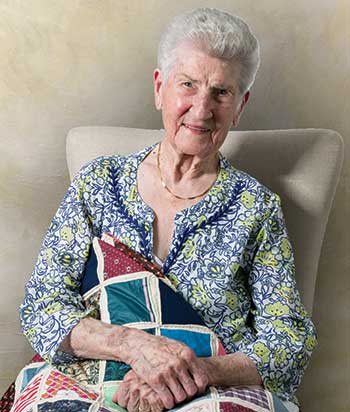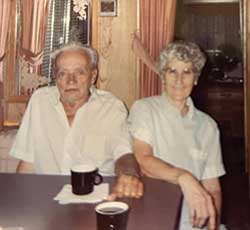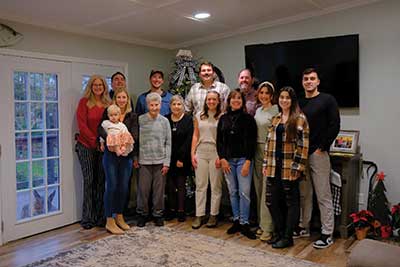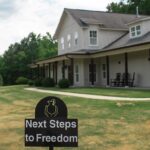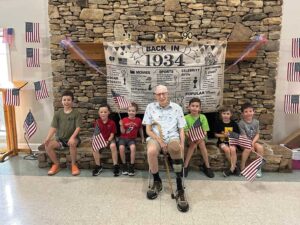
Springville’s Own Gatha Harvey
Story by Joe Whitten
Submitted Photos
It was 2011 when retired Pell City educator Deanna Lawley offered an idea to help boost the Pell City Schools Educational Foundation’s On Dec. 8, 1941, at 12:30 Eastern Standard Time, a solemn silence settled over the nation as stunned citizens heard President Franklin Rosevelt over the radio intone these stark words: “Yesterday, December 7, 1941 – a day which will live in infamy – the United States of America was suddenly and deliberately attacked by the naval and air forces of the Empire of Japan.”
Six and a half minutes later, President Rosevelt ended his address: “I ask that the Congress declare that since the unprovoked and dastardly attack by Japan on Sunday, December 7th,1941, a state of war has existed between the United States and the Japanese Empire.”
Gatha Harvey of Springville, Alabama, remembers how she learned of the Pearl Harbor attack. “We had been up to my sister’s and were on our way home,” she recounted. “Daddy always liked to have music, so he had the radio on, and they interrupted the program and told about Pearl Harbor being bombed.”
Americans were galvanized toward winning this war. Scores of youths dropped out of high school to join the military. Women became part of the war effort by working jobs previously occupied by men now fighting in various parts of the world.
Gatha would soon become part of the women’s work force.
From Hartwell to Marietta, Georgia
Graduating high school in 1944 at age 17, she wanted a job, but Hartwell offered very few choices – working in a sewing factory or clerking in a department store. Not an exciting outlook for her.
Then her aunt and uncle came from Marietta for a visit one weekend. Gatha recalls the day. “Daddy’s sister, Ruth, and her husband were working in the Bell Bomber Plant in Marietta, Georgia. They made B-29 planes. She said, ‘Why don’t you come to Atlanta with us?’ ” And I said, ‘I don’t know if Daddy would let me go that far away.’ ” However, Ruth did the asking, and Gatha’s daddy did indeed let her go with them.
At Bell Bomber Plant, Ruth took Gatha to the employment office, and they hired her. “I started working on airplane wings, bucking rivets,” Gatha smiled. An online article, Buck Riveting Basics, explains the process. “A bucked rivet is a round fastener that attaches two or more pieces of metal together. The rivet is driven by a rivet gun (a specialized pneumatic hammer) with an attached rivet set (strike surface) shaped to match the rounded shape of the manufactured head of the rivet. During the process, the tail of the rivet is backed up by a bucking bar that acts as an anvil while the rivet gun and set are repeatedly striking the head. As the rivets are driven, the tail (blunt end) of the rivet is transformed into a flat mushroom called a ‘shop head.’ ” So, in June 1944, Gatha officially became a Rosie the Riveter – a group still famous.
“The first day I was working,” Gatha reminisced, “I’ll bet I had gone that far (measures about two or three feet with her hands), and the inspector came to check my work. He was a young man, and he marked every one of my rivets, and I had to take ‘em all out. And I thought, ‘Boy, you sure are mean.’ Every one of my rivets had to come out because they were too close to the edge. So, I got ‘em all put in, and got ‘em right, and kept going. If we hadn’t got ‘em out, that plane could have come apart when it got in the air.”
The inspector, Alfred Harvey, was not mean after all, because four months later, on Oct. 21, 1944, he and Gatha White were married – a marriage that lasted 47 and a half years until Alfred’s death in 1992.
In January 1945, expecting their first baby, James Richard, Alfred and Gatha quit their jobs at Bell Bomber and moved to Birmingham. Alfred worked for a while in an airplane plant, then drove a truck. His sister who worked in the Tax Assessor’s office and suggested that if he wanted to drive a truck, he should take the Civil Service Test and work for the city of Birmingham. He took the test, passed it, was hired and worked 29 years for the city.
“We had a good life,” Gatha reflected. “On Oct. 28, 1945, my son Jimmy Harvey was born., and seven years later my daughter, Alice Faye Harvey Stone was born. We weren’t rich, but we had a good life.”
Growing up
In the summer of 1926, a heatwave skewered Georgia, and on the day Gatha White was born, July 21, the sun blazed over the horizon and sizzled the thermometer up to 108 degrees at Reed Creek community, her birthplace. It’s still the record heat today.
The fifth of nine children born to Judge Reese White and his wife, Arlie Maude Brown White, Gatha talked of her early years. “My daddy was a farmer. He raised corn, cotton and vegetable gardens.” All farm family children worked a farm thinning corn, chopping cotton, weeding the vegetable garden, gathering the vegetables – whatever the season required. “There were nine of us,” Gatha reminisced, “and as we got big enough to work, we all worked in the field.”
When the cotton matured, they helped with the harvest. “We would get out of school in September for six weeks to pick cotton,” Gatha recalled. This discontinuing of school for several weeks, called “getting out for cotton picking,” was a common practice in Southern states.
“We had a good time,” Gatha smiled, recalling home and her brothers and sisters. “On Sunday, my daddy would hitch up the mules to the wagon, and we’d go to church. And if there were any neighbors that didn’t have a way, he’d take them with us in the wagon.” The family mostly attended the Baptist church, but many churches had preaching only once a month, so the family attended whichever denomination was having church on Sunday.
Remembering those long ago preachers, Gatha reflected, “Sometimes they would pay the minister with chickens. Vegetables. They seldom got much money.”
She reminisced about school. “We went to a country school and rode the bus at Reed Creek. Then when we moved to Hartwell, Georgia, we’d walk to school. We all graduated high school.”
Gatha’s favorite subject in school was cooking class. “I used to watch my mamma cook, but she wouldn’t let me cook, so I would watch her. She could make some of the best biscuits.”
This recollection led to more food memories. “We’d go to the garden and pick beans, she’d can ’em. Pick peas, she’d can ‘em. Tomatoes, she’d can. Apples, she would dry. She had a frame that she’d put the sheets on, and we’d peel the apples and peaches, and she’d put ‘em out there to dry, and we’d have dried apple pies. You had to cover them up to keep the flies off.
“And we had homemade ice cream. And we made lemonade – got lemons and made it in a tub. We had a good life,” she smiled.
The family raised their own beef and pork. When hog killing time came, nothing was wasted. “Mamma and Daddy would cut pork chops, and they cured the hams with salt. We used everything but the chitlins,” Gatha recollected. “Mamma fried the sausage and put it in quart jars and canned it. She made souse meat.”
Souse meat, sometimes called hog’s head cheese, was the forerunner of sandwich lunchmeat. Gatha tells how her mother made it. “She’d boil the head and the pigs’ feet and get all the meat off that. And she put other stuff in it and she’d scrunge (squeeze) it up and put it in a big pan and put a lid on it and pressed it down to get all the grease out of it. It’s really good.”
Old recipes add various spices – pepper (black and red), sage, garlic, cloves and pickling spices. Old directions also recommended putting the souse meat in the smokehouse for a while before serving it.
Printed flour sacks and feed sacks were a godsend during lean economic days. Gatha recalled “Mamma would show daddy the sack design that she wanted him to get at the store, and when she got enough of the same design, she made our dresses. I never had a bought dress.”
From Birmingham to Springville
Gatha’s memories returned to her married life and living in Birmingham. “We lived in Woodlawn. We rented a house that had an apartment, and Alfred’s mother and daddy moved into the apartment. I cooked on Sunday to have ready when they come home from church, and my father-in-law liked pot liquor (turnip greens broth) with cornbread.”
After Alfred’s father died, the Harveys bought a house in Center Point and Alfred’s mother, who used a wheelchair, reluctantly moved with them. “She knew she was gonna have just one room and use of the house. Well, when all the neighbors made her welcomed, she was satisfied. She lived with us until ’74.”
After that, she moved in with her daughter for a while, and then into a nursing home. “She was a good lady. And she always said, ‘I hope you will have a daughter-in-law that’s as good to you, as you are to me.’ And if she was living, she’d know now that I did.”
Gatha’s eyes twinkled as she said, “My mother-in-law had a cough, and one of her sons, Ralph, was a policeman on the Birmingham police force. So, he brought her a pint. She mixed it with lemon and honey – made her a toddy. Well, that went on for about a month, and she said, ‘Ralph, bring me another pint of whiskey. I’m out.’ He said, ‘Mamma, you didn’t drink all that!?” Her reply was, ‘A little bit at a time,’ then added with justification, ‘Well, I had a cough.’ “So, he brought her another pint.”
Alfred had always wanted to travel, so prior to retiring, he had purchased a motorhome for traveling days to come. When he retired, they sold their home and headed out in the motorhome.
Their son, Jimmy, and his wife, Betty, had Springville property where Jimmy built a carport high enough for them to pull the motorhome under and a porch for them to step out onto when it was parked. He also put in a water hookup and installed a septic tank. They would come back from a trip and be at home in Springville in the motorhome until the next excursion.
Alfred and Gatha’s days of travel were cut short by Alfred’s emphysema. They returned from a Florida trip, and the drive home was difficult for Alfred. He had a doctor’s appointment but was so weak that Gatha drove him. His doctor put him in the hospital where he stayed 10 days, during which time he was put on oxygen. Gatha brought him home, where he died April 8, 1992.
Gatha kept active, and her four grandchildren, eight great-grandchildren, and her one great-great-grandchild, have all been blessed by her love and concern for them, for she speaks of them with smiles on her face. Each one has received a quilt – all hand-stitched and hand-quilted – with love in every stitch. Granddaughter Sonya’s quilt has scraps of dresses Gatha made for her when she was small. Grandson Richard commented on her grandmothering: “She took care of my sister and me when we were growing up, and we developed a special relationship with her. She was stern, but she was gentle. We loved her to pieces.”
The family also enjoys her cooking. At Christmas time, she always makes the dressing. She makes banana nut bread for granddaughter Sonya, her daughter-in-law Betty and herself. Grandson Richard Harvey – Springville’s Fire Chief – gets his favorite poundcake. Betty relates how “Gatha makes a buttermilk poundcake – it was my mother’s recipe – and she’s got the Springville Fire Department spoiled with it.”
Asked about the poundcake, Richard responded, “Oh, her poundcake. Yeah, she makes probably the best poundcake that’s ever been. But it’s not just me; it’s the entire Fire Station. The guys love it when she makes us poundcake.” Richard allows that the cake is especially delicious with strawberries and whipped cream.
Springville First Baptist Church
When the Harveys began parking their motorhome in Springville, Mrs. Barfield, their neighbor across the road, invited Gatha to go with her to church at Springville First Baptist Church where she was a member. Gatha accepted and went with her when she and Alfred would be in town between travels.
After Alfred passed, she became an active member of the church and was involved in its ministries – especially Sunday school and Saints Alive, the senior citizens group at the church. For Saints Alive, Gatha helped two directors, Geniva DuPre Smith and Linda Lee, by calling members to remind them of meetings or trips planned for the group.
At a recent Saints Alive lunch meeting, attendees sat by birth month at round tables, and Gatha lunched with five men who ranged in age from mid-60s to an 89-year-old. At the end of the meal, she got the group’s attention and said, “I’d like to say how much I have enjoyed dining with these younger men.” This is typical Gatha humor, as her neighbor, Dennis Jones, recently affirmed by telling, “Every time the TV says, ‘Check on the elderly,’ Gatha calls and checks on me – even though I’m 25 years younger.”
Today Gatha is the First Baptist church-member who has accumulated the most years of living. Until two years ago, she drove herself to church. Now Betty brings her.
At 97 / 98, Gatha rarely ever misses a Sunday school class or worship service. Her Sunday school teacher, Beverly Bullock, remarked, “Gatha Harvey is an example of a quiet soul who speaks loudly about her Lord and makes an effort to be in God’s house every Sunday.”
Tom Brokaw called the WWII era the “greatest generation,” and Eleanor Roosevelt said of the women of her day: “A woman is like a teabag, you don’t know how strong it is until it’s in hot water.”
Having lived almost 100 years, whatever “hot water times” Gatha has experienced has made her stronger. Whether the hot water of having to remove her first row of rivets or the twists and turns of living almost a hundred years, Gatha exemplified the strength Eleanor Roosevelt acknowledged.
Gatha’s grandson Richard Harvey agreed. “My grandfather treated her like an angel – he did everything for her, but at the same time she did everything for him. She was the classic housewife of that generation. Then when he passed, she was pretty much on her own and had to take care of herself. She had never driven when he passed, so at 65 she got her driver’s license.” He paused, then added, “She was never afraid.”
Whether Gatha Harvey is patriotic Rosie the Riveter, faithful wife, well-loved mother-in-law, or loving grandmother, she is an inspiration to all who know her, for she is an example of a life well-lived.
Richard recently told of his grandmother’s 90th birthday. “I said, ‘Grandma, what’s something you’ve never done?’ And she said, “I’ve never ridden a motorcycle, and I’ve never flown in a plane.’ So, for her 90th birthday, I put her on the back of my motorcycle and drove up to Ashville to a friend who had a plane. We put her in the plane, and he flew her all over St. Clair County.”
In anticipation of upcoming birthdays, Richard says he keeps asking her, “When are we gonna jump out of that plane?” Her answer so far has been, “I don’t think I’m gonna do that.”
How about it, Gatha. Is that water really too hot?











